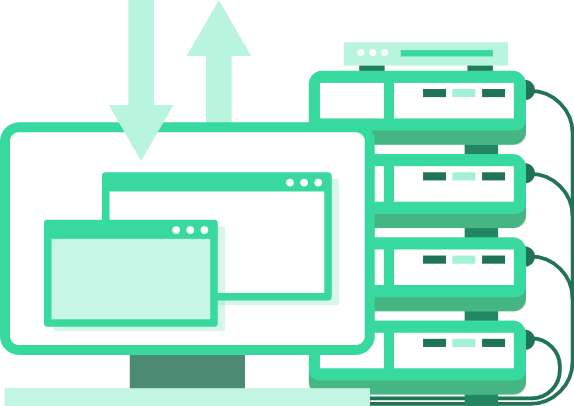
Tailored for Growth: Whether you’re a growing startup or an established company, our servers are designed to scale with you, ensuring you always have the resources you need.
Sustainable Future: By condensing your resources, you save on operational costs and contribute to a greener, more sustainable future by reducing energy consumption.
24/7 Support: Our dedicated team is always available to assist you, promptly addressing any concerns or issues.
Industry-Leading Performance: With the combined prowess of AMD EPYC processors, 4TB NVME Drives, and up to 128GB RAM, experience performance like never before.
JUST CHOOSE YOUR LOCATION AND CONFIGURE SOFTWARE, BANDWIDTH AND ADD-ONS — DEPLOY INSTANTLY
For high traffic sites, database management, applications, resellers.
$419/moFor large databases, SaaS apps, large resellers, enterprise apps.
$549/moVirtualization server for VMware alternative hypervisors.
$2,340/moOur infrastructure experts can tailor the right solution for your needs.
For high traffic sites, database management, applications, resellers.
$419/moFor large databases, SaaS apps, large resellers, enterprise apps.
$549/moVirtualization server for VMware alternative hypervisors.
$2,340/moFor smaller websites and dev/test environments.
$99/moFor dev/test environments, moderate-traffic websites.
$129/moFor small apps, small databases or batch processing tasks.
$149/moOur infrastructure experts can tailor the right solution for your needs.
A bare metal server is a physical server which is dedicated to a single tenant. These servers are well known for providing a great performance, no matter what. Bare metal servers offer a range of benefits for businesses hoping to expand, and they’re vital if a company wants to ensure the reliability of its systems even if the unexpected happens.
A bare metal server eliminates unnecessary layers, by installing the operating system directly on the server. This results in enhanced capabilities which can be used to improve on the performance of the server itself.
Bare metal servers are commonly housed at specialized data centers, where they are maintained and secured by dedicated teams of experienced IT professionals. However, bare metal servers can also make up part of a company’s in-house provision, if a company has the expertise and space required to facilitate this.
Bare metal servers and cloud servers both offer some great benefits to small and medium sized businesses, particularly when you look at their hardware performances and elimination of hardware failure risks. However, there are a few marked differences in the experience that these types of servers provide, which are worth looking into before you decide on the best option for your company.
Cloud servers are of course cloud-based. This means that their resources are shared virtually, which can result in limitations that may hold a system back. There are benefits to be had from cloud servers, though, and these are clearest when you look at how easily customizable cloud servers are. The servers are easy to adjust to any system requirements, and can be scaled up or down – as and when required.
Bare metal servers aren’t quite as easy to scale as cloud servers, but they do not share resources. So, bare metal servers are able to offer a better level of security to tenants, and the costs of storage on bare metal servers tend to be lower than that of their cloud-based counterparts too.
While bare metal servers are a relatively new phenomenon, their more traditional counterparts are the better known dedicated servers. At first glance, the capabilities of these two types of servers may seem remarkably similar. But delve a little deeper and you’ll soon see that bare metal servers offer an experience that’s quite different.
Dedicated servers give users complete control over a physical machine, and they don’t require users to share space with others while using the server. So, they’re a good option for websites that tend to attract high volumes of traffic, and they’re well used by many popular web applications. They’re widely recognized as a reliable option for large-scale businesses, and they tend to offer a good level of performance.
Bare metal servers also offer a great performance every time, but the ways in which they do so are a little different. Bare metal servers eliminate some layers, to drive up performance in a way that users can really see. Provisioning protocols are refined by bare metal servers, and set up times are far shorter thanks to the process automation.
If you’re using a bare metal server, it’s vital that you understand how to backup the server in case anything were to go wrong. Bare metal servers do offer a good level of security, so it’s unlikely that you would need to use your backups in a real emergency. But it’s always good practice to ensure that your bare metal server is backed up regularly just in case.
There are several different ways to coordinate and manage backups of a bare metal server, so the best option for your needs will depend on your own system requirements. Look into the technical specifications of your bare metal server for full details on how to create backups, and learn how to create the best backups for your system. If you have any questions regarding backups, don’t hesitate to contact our team for advice and assistance.